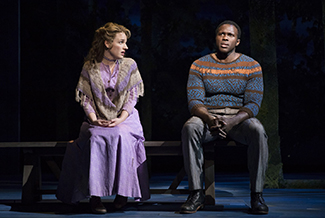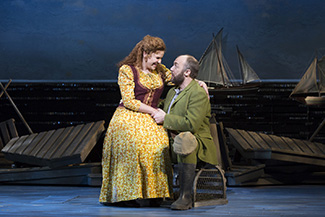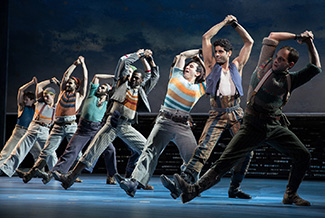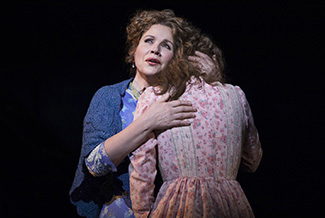Carousel
Imperial Theatre, NYC, April 14, 2018
Reviewed by Elizabeth Ahlfors for Cabaret Scenes

Photo: Julieta Cervantes
If you are looking for another Rodgers and Hammerstein classic with the sunny optimism of their first hit, Oklahoma!, you will not find it at the Imperial Theatre. What you will find is something darker, more soulful, with a doomed love story unveiled through melodic songs and vigorous dances that express its realism and fantasy. That show is Carousel, Oscar Hammerstein II’s challenging musical theater translation of Ferenc Molnár’s tale Liliom, transplanted from Budapest to a 19th century Maine fishing village.
Directed by Jack O’Brien, the love story of Julie and Billy is star-crossed and sensuous, with galvanizing performances by Jessie Mueller (Beautiful) and Joshua Henry (The Scottsboro Boys). A magnetic chemistry of opposites, Mueller’s Julie Jordan is beautifully understated as the shy but perceptive mill worker who is captivated by a lusty carnival barker, Billy Bigelow, played with tortured impulsiveness by Henry, a fiercely talented actor/baritone. Julie’s best friend, spunky Carrie Pipperidge (Lindsay Mendez), warns that Julie’s attraction to Billy is headed for trouble, a feeling that becomes obvious as Julie and Billy join for theater’s memorable duet of ambiguity, “If I Loved You.” No, there really is no other option for them but full-throttle commitment.

Photo: Julieta Cervantes
O’Brien acknowledges the darkness in Billy that leads him to hit Julie. Billy’s abuse is as timely an issue today as it was back then, and Julie’s tolerance is still not unusual. Now pregnant, when Carrie urges her to leave him, Julie responds with, “What’s the Use of Wond’rin'”(“You’re his girl and he’s your feller/And all the rest is talk”). Note Hammerstein’s use of the hard “k” sound in “talk,” a quick ending to the song. Julie understands Billy’s insecurity and why he hits her.
Joshua Henry’s nuanced performance of machismo and recognition of the bigotry toward African-Americans, blanketing Billy’s buried gentleness, is exemplary. He loves Julie deeply and, learning about her pregnancy, he delivers “Soliloquy” with powerful determination and pride, as sensitive as any rendition I have heard. When he realizes, “But what if he…is a girl?” he is motivated to straighten up and make some money. (“You got to be a father to a girl…”).

Photo Credit: Julieta Cervantes
The villain of the piece is Jigger, played by Amar Ramasar, a talented dancer from the New York City Ballet, who also proves himself a convincing actor. In the rousing dance, “Blow High, Blow Low,” Jigger convinces Billy to join him in an ill-fated crime.
Mendez (Significant Other) as Carrie has a staid love interest, Enoch Snow, played by Alexander Gemignani (Les Misérables). They bring warmth and light humor to the show and their songs, notably the sentimental glow of “When the Children Are Asleep.” Julie’s nurturing older cousin, Nettie Fowler, is played by opera soprano Renée Fleming, who consoles Julie with a spectacular rendition of “You’ll Never Walk Alone.” Also outstanding is Margaret Colin as Billy’s carnival boss and lover who tries to lure him away from Julie.
John Douglas Thompson plays the Starkeeper (or gatekeeper) for “The Highest Judge of All.” This most challenging ending to the story leads to a bittersweet ending for Billy and the daughter he never met, Louise.

Photo: Julieta Cervantes
Choreographer Justin Peck (New York City Ballet) has designed spectacular dances, including a ballet by Amar Ramasar and Brittany Pollack (the teenage daughter of Julie and Billy who also comes from the NY Ballet company). Peck stresses that he has studied the choreography of Agnes de Mille, who choreographed the original 1945 production, but insists the dances are his own and, evidently, they propel the dance storytelling from the start with “The Carousel Waltz.” Ann Roth keeps the characters in simple dress of the period and place. Unfortunately, Santo Loquasto’s sets are uninspiring, except for a dazzling entrance for the colorful carousel, setting the anticipation of a fair coming to town. A lush chorus is stirring in company numbers like “June Is Bustin’ Out All Over,” and Jonathan Tunick’s orchestrations led by music director Andy Einhorn are exhilarating in this show that is largely music with little dialogue, or, as Richard Rodgers said, “came very close to opera.”
Carousel is a stimulating musical with smashing performances and Rodgers and Hammerstein’s wondrous and perpetual theater classics, making this a show to see.





